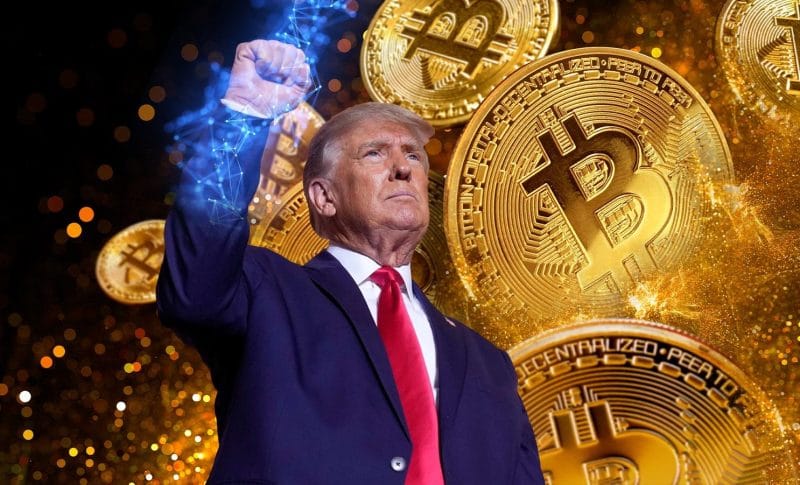Trump's Proposal for Tax-Free U.S.-Issued Cryptocurrencies Like Bitcoin, Cardano, and XRP

In a significant policy shift that could reshape the crypto landscape in the United States, former President Donald Trump has hinted at potentially groundbreaking changes in how cryptocurrencies are taxed.
The proposal, which has stirred discussions across financial and tech sectors, suggests that digital currencies issued in the U.S., such as Bitcoin, Cardano, and XRP, might soon enjoy tax-free status. This article delves into the implications, potential benefits, and the broader economic impact of such a policy.
Imagine waking up to find that your investment in Bitcoin or your latest stake in Cardano or XRP could yield returns free from the usual tax obligations. This vision could become reality if Trump's hinted tax reform sees the light of day. The policy, if implemented, would not only boost the attractiveness of these cryptocurrencies but also potentially position the U.S. as a leader in the digital currency space.
The Genesis of the Proposal
The idea emerged from Trump's recent discussions about economic recovery and innovation. During a rally, he mentioned his intent to "make America the leader in cryptocurrency," which many interpreted as a nod towards integrating cryptocurrencies more deeply into the American financial system. This rhetoric aligns with his past comments on embracing new technology to foster economic growth, though specifics on how this would be executed remain under wraps.
Economic and Market Implications
The primary allure of tax-free status for cryptocurrencies would be the potential influx of investors. By removing the tax barrier, the U.S. could see a surge in crypto investments, both from domestic and international investors looking to leverage this new fiscal advantage. This could lead to:
An increase in liquidity for cryptocurrencies like Bitcoin, Cardano, and XRP, potentially stabilizing or even boosting their market values.
Enhanced economic activity around blockchain technologies, as businesses might find it more viable to operate within the U.S. due to the favorable tax environment.
A shift in global investment patterns, where investors might prefer U.S.-based crypto operations or holdings to capitalize on the tax benefits.
However, this proposal isn't without its challenges. Critics argue that making cryptocurrencies tax-exempt could lead to significant revenue losses for the government, potentially impacting public services. There's also the concern of how this policy would be policed to prevent tax evasion or the misuse of cryptocurrencies for illicit activities.
Political and Regulatory Hurdles
Implementing such a sweeping change would necessitate a reevaluation of current tax laws, which are complex and intertwined with international financial regulations. Trump's proposal would need bipartisan support, which is no small feat in today's polarized political climate. Furthermore, the regulatory framework for cryptocurrencies is still in its infancy, with agencies like the SEC and CFTC grappling with how best to oversee these assets.
The IRS, for instance, would need to redefine what constitutes a 'U.S.-issued' cryptocurrency. Would it be based on where the company is headquartered, where the blockchain nodes are primarily located, or where the majority of transactions occur? These questions are pivotal and could redefine crypto's regulatory landscape.
Global Context and Crypto's Future
Globally, the U.S. tax proposal could trigger a competitive response from other nations, potentially leading to a race to the bottom in terms of crypto taxation to attract investment. Countries like Switzerland and Singapore, already known for their crypto-friendly policies, might adjust their strategies accordingly.
Moreover, if the U.S. goes ahead with this, it might encourage more mainstream adoption of cryptocurrencies. Financial institutions, already warming up to digital currencies, could accelerate their integration into conventional financial products, like digital wallets, loans, and even mortgages backed by crypto assets.
Trump's proposal to potentially make U.S.-issued cryptocurrencies like Bitcoin, Cardano, and XRP tax-free is a bold move that could redefine America's role in the global crypto market. While fraught with regulatory, economic, and political challenges, the move could catalyze significant growth in the sector. As these discussions evolve, the crypto community watches with bated breath, hoping for clarity and a regulatory framework that not only fosters innovation but also ensures a balanced economic environment. This proposal, if realized, might just be the catalyst needed for cryptocurrencies to transition from niche investments to mainstream financial assets.

